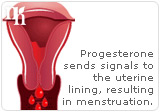Hormones are chemical messengers that influence nearly every cell, organ, and function in the female body. Thus, when natural hormone levels become erratic during menopause, they can leave you feeling uncomfortable and disrupt your daily routine. Progesterone is an especially important hormone for women, so when progesterone levels become unbalanced, they can cause bothersome signs, which indicate that an imbalance may be present in the body. Read on to learn about the role of progesterone in the female body.
What Is the Role of Progesterone?
 In premenopausal women, progesterone works in tandem with estrogen to regulate the menstrual cycle and prepare the uterus for a fertilized egg each month. If fertilization does not occur, progesterone signals the uterine lining to be shed, resulting in menstruation. If the egg is fertilized, progesterone levels increase to support the body during pregnancy.
In premenopausal women, progesterone works in tandem with estrogen to regulate the menstrual cycle and prepare the uterus for a fertilized egg each month. If fertilization does not occur, progesterone signals the uterine lining to be shed, resulting in menstruation. If the egg is fertilized, progesterone levels increase to support the body during pregnancy.
During menopause, hormone production drops drastically in the female body, signaling the end of menstruation and, in turn, the fertile period of a woman’s life. During this time, progesterone dominance can occur as the direct result of reduced estrogen levels. There are several indicators of high progesterone levels, which include:
- Breast tenderness. Progesterone dominance (indicating a deficiency in estrogen) may cause your breasts to feel extra sensitive just before menstruation, during pregnancy, or throughout menopause.
- Mood swings. Progesterone is thought to influence mood through its interaction with the neurotransmitter serotonin. Thus, when progesterone levels increase, so can irritability or low moods.
 Vaginal dryness. The hormone estrogen helps to maintain a thick and lubricated vaginal lining, so when the balance between estrogen and progesterone becomes disrupted, vaginal dryness can occur.
Vaginal dryness. The hormone estrogen helps to maintain a thick and lubricated vaginal lining, so when the balance between estrogen and progesterone becomes disrupted, vaginal dryness can occur.- Bloating. Especially common before menstruation, bloating can occur when the body’s hormone levels are tipped in favor of progesterone.
- Loss of libido. In order for a woman to feel sexual desire, she needs to maintain balanced levels of the three primary sex hormones: progesterone, estrogen, and testosterone. Therefore, a deficiency of one hormone can have a significant impact on her sex drive.
How Can I Restore Normal Progesterone Levels?
Progesterone imbalances may be treated using several different approaches. Most doctors recommend making simple diet and lifestyle changes before considering herbal remedies or pharmaceutical options to treat progesterone imbalance, as these treatments may trigger unwanted side effects or pose serious health risks. Consult with your doctor to find the treatment that’s right for you. Click on the following link for more information about treatments for progesterone imbalance.
• Progesterone: Overview. Healthywomen.org – http://www.healthywomen.org/condition/progesterone
• Dr. Love, Susan, and Karen Lindsey. Dr. Susan Love’s Menopause and Hormone Book. New York: Three Rivers Press, 2003.
• BMJ Group. “Menopause: What is it?” Patient Leaflet. 2007.
Share This |
|---|
Our Readers also liked
- What does progesterone do? 2,696 views
- What Are the Effects of too Much Progesterone? 903 views
- 4 Foods to Boost Progesterone Levels 419 views